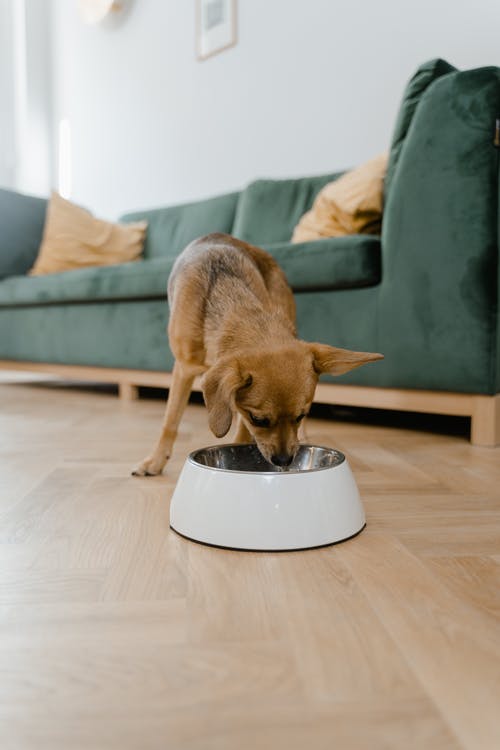Fresh fish is an important part of a healthy human diet. The same is true for dogs, as fish is rich in digestible protein, nutrients, and omega-3, which help your dog to grow and thrive. Many pet owners introduce seafood snacks to their dogs’ diet while mixing in a little fish to their daily diet is another good way of enriching your dog’s diet. So, with that in mind, is tuna safe for your dog to eat? Let’s find out.
Is tuna safe for dogs to eat?
As a rare treat, tuna is safe for your dogs to eat in small amounts. However, it shouldn’t become a staple for your pooch. Tuna is rich in omega-3 and protein and can contribute to the health and wellbeing of your dog. However, you shouldn’t regularly feed your dog tuna, as it is also a source of mercury. Too much tuna can lead to an excess of mercury for your dog, which can lead to a range of long-term health complications. The same is true if you feed your dog too much mackerel. The best type of fish to feed your dog is short-lived fish that has lower mercury levels. You also need to consider the type of tuna you feed to your fish, as we explain below.
What about canned tuna?
One of the cheapest and easiest ways of introducing fish into our diets is to buy canned tuna. But is it safe for our dogs? First and foremost, canned tuna typically comes from Albacore or Skipjack tuna, and Skipjack is safer for your dog. This is because it has lower levels of mercury. You also need to be mindful of the salt content of canned tuna, as many brands and varieties are high in salt. So, look for canned tuna that doesn’t have any added salt. You should also avoid canned tuna that has additional seasoning and spices as they can cause illness in your pooch.
Is tuna in brine okay for your dog?
While small amounts of brine shouldn’t cause your dog issues, it’s best to avoid it as a general rule when feeding tuna to your dog. This is because it is high in salt, and too much can lead to sodium poisoning. The best choice when it comes to canned fish is tuna that has been preserved in water, as it has less salt and fat when compared to other types of tuna.
Is tuna in sunflower oil fine for your dog?
Provided you drain the fish thoroughly before serving, you can give your dog a little bit of tuna that has been preserved in sunflower oil. However, too much fish in oil can cause your dog to gain weight, and if the omega-6 in oil isn’t ingested with omega-3, it can lead to unwanted immune responses. So, while tuna in sunflower oil isn’t likely to cause your dog too many issues, tuna canned in spring water is the best choice.
How do dogs react to tuna steak?
Humans typically favour bluefin tuna steak, and many of us enjoy raw tuna as sushi and sashimi. But feeding dogs raw tuna is a bad move, as it might carry parasites that could cause more harm than good. Bluefin tuna is also high in mercury levels, which isn’t good for your furry friend. If you’ve purchased Albacore or Skipjack tuna, these varieties are lower in mercury and are better for your dog, so you can feed them small amounts. If you decide to serve your dog tuna steak, make sure it is cooked and unseasoned.
Which species of tuna is best for your dog?
While your dog can eat any species of tuna in small amounts, you need to be mindful of the mercury level of fish before serving it to your dog. So much rubbish and pollutants end up in the ocean, including heavy metals such as mercury. The longer a fish has lived, the more mercury and other heavy metals have built up in their system. Tuna is a large and long-living fish, meaning it usually has higher mercury levels than other species. However, Skipjack tuna is a smaller species than Albacore and Bluefin, so it’s worth serving your dog Skipjack tuna if you have the option to. So, to reduce the risk of mercury poisoning, you should only feed your pup small amounts of tuna, regardless of the species.
How much tuna is safe for dogs?
Overall, tuna is safe for your dog if you serve it in moderation. Limit your pup’s tuna consumption to one tablespoon per serving, and try not to feed them tuna every day. After serving them tuna, you should monitor your pup’s health for any illness or reaction and take them to the vet immediately if you notice any negative signs. Pure Pet Food’s recipes contain safe levels of fish for your pooch and are a great way to improve your pet’s omega-three intake. Create a tailored plan for your dog today and ensure the foods they eat are suitable for their health and wellbeing.

